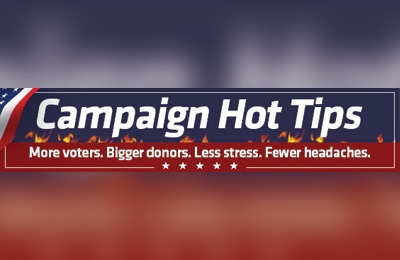Be Bold for Big Bucks
Fundraising dollars don’t flow like the river Nile to wishy-washy, middle-of-the-road, don’t-rock-the-boat candidates. If you want the big bucks, you need to stand above and apart from the crowd. Just ask Texas Republican Sen. Ted Cruz.
As you probably know, Cruz led a filibuster against ObamaCare this fall. It was not successful. And he’s taken a lot of heat for his efforts from establishment Republicans and the media.
On the other hand, Politico reports that in the third quarter that just wrapped up, Cruz “brought in a combined $1.19 million between his joint fundraising committee, his reelection committee and his leadership PAC, and the Senate Conservatives Fund – a big backer of Cruz and his efforts – brought in $2.1 million in September alone, its second-highest fundraising month ever.”
‘Nuff said.
Campaign Conference Calling
A great way to keep your campaign staff/volunteers as well as donors involved in the campaign is to host regular conference calls to give updates, polling results, fundraising successes, news, etc. There are a number of services out there providing simple ways to conduct these calls, but I’ve had great success with one service that has a lot of valuable features and won’t cost you a dime.
Check out www.FreeConferencing.com
Author! Author!
Ever heard of Jonathan Macey? Me, neither. But apparently he’s the author of a book titled, “The Death of Corporate Reputation: How Integrity Has Been Destroyed on Wall Street.”
What? Never heard of the book? Me, neither. But that’s not the point.
The point is, Mr. Macey got a column published in the Wall Street Journal this week and his bona fides, detailed at the end of the column, includes that fact that he’s the author of a book no one’s ever heard of outside of a VERY small segment of the population.
The book needn’t be a NYT best-seller. An author of even a book no one’s ever heard of projects authority and opens a lot of doors, especially with the media. Not to mention speaking engagements.
And if you’re running for office, any office, you need to SERIOUSLY consider becoming an author of your own book.
Oh, and it’s neither hard nor expensive to do so. I explain the whole thing in November’s Winners Circle newsletter (see below) which should be going out the first of next week. If you’re not a Winners Circle member yet, click here for information on how to get a two-month free subscription.
Coming up in November’s “Psephology Today”…
Phsephology (see-follow-gee) is the study of campaigns and elections. Psephology Today is the monthly membership newsletter for Winners Circle members. Here’s a snapshot of what’s covered in November’s issue, which will go out next week (so sign up for your FREE trial membership TODAY!)…
- 2 great, can’t-miss “ice-breaker” questions to ask any stranger, especially when campaigning door-to-door
- The 5 words new candidates love to say…but never should!
- The single best piece of candidate advice from the author of “Rich Dad, Poor Dad”
- The 1 thing you better hire a professional to do for your campaign
- A little-used technique that is 10 times more powerful than getting an endorsement (this trick can be wildly effective in coun
ter negative attacks) - A one-paragraph trick from the business world that will dramatically boost your level of trust from voters while removing hesitation from donors
- A common, easily avoided mistake Sen. Rand Paul made in a recent fundraising letter
- Why mailing personal letters could be better than traditional campaign postcards…and a 7-piece mail schedule for Republican primary contests
- The biggest secret to delivering great political speeches…and a simple question that will spark audience participation like you wouldn’t believe (this will have them eating out of your hand by the time you’re finished!)
- #1 guaranteed best way to get more people to read your campaign literature or watch your campaign video (Democrats have been using this “secret” for years)
- How to get donations from people who don’t even live in your district
- A simple little trick to get a lot of small groups to band together in support of your campaign (the Ron Paul people were GREAT at this)
- A better way to recruit volunteers which is the exact opposite of how 95% of campaigns do it
- How $25 can get you the best “continuing education” from the best fundraising copywriters and direct mail professionals in the country today
- A little-known but widely recognized and inexpensive technique guaranteed to immediately grab the attention of your direct mail fundraising prospects
- A proven yet virtually unused way for you to get your campaign literature delivered to every voter in your district FREE (you’ll immediately recognize this technique from the business world as soon as you read it)
- The single best way to boost your name ID…which many high-priced political professionals will self-servedly discourage (don’t listen to them!)
- Wanna boost the number of people who opt-in to your campaign email list? Believe it or not, the government can help! Here’s the website address for this invaluable resource.
- Not sure how to set up a finance committee to have others raise money for your campaign? Here’s a little trick that will make it simple and easy.
- My top 3 books I recommend that every candidate – new or old – read. Then re-read. Then read again.
Click here for a special offer that includes a two-month free trial membership to the Winners Circle, including November’s edition of Psephology Today.
Famous Last Words
“There are two things that are important in politics. The first is money, and I can’t remember what the second one is.” – Mark Hanna, campaign strategist for President William McKinley

